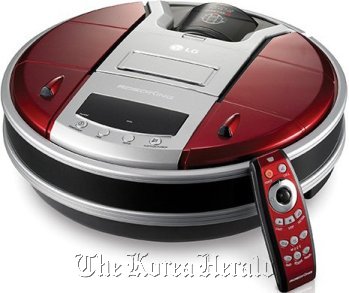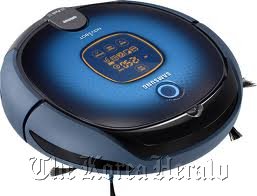Cleaning robots pep up slumping market for home appliances
By Korea HeraldPublished : Dec. 25, 2011 - 18:19
Sales of robotic vacuum cleaners in Korea have more than tripled in three years, perking up the sluggish local market for home appliances, industry data showed Sunday.
The market expanded at an average rate of 56 percent over the last three years, from a scant 36,000 units in 2008 to 130,000 this year, the data showed. That is expected to further grow to 170,000 units next year.
The upbeat growth was driven by surging demand for easier, quicker and more fun solutions to household chores among Korean dual-earner couples and working moms, analysts said.
“(The market’s) driving forces are the compelling aspects of achieving a better use of time, creating more time for people. Using robots that replace manual cleaning is compelling,” said Winter Green Research, a research firm.
Globally, the market is forecast to nearly quadruple to $2 billion by 2016 from $506 million in 2009, the U.S.-based company said in a report.
Robot cleaners have also emerged as a new battlefield between Korean technology giants ― led by Samsung and LG ― competing to roll out cheaper and more dexterous products.
Leading the fledgling market is LG Electronics, whose RoboKing boasts a more than 50 percent share. Samsung Electronics accounts for some 30 percent, followed by iRobot Korea, a midsize manufacturer, with around 7 percent.
RoboKing Triple Eye, the sixth-generation model introduced in August, carries three cameras and 51 sensors to read its surroundings while tidying up rooms. It sweeps and vacuums much faster and quieter than previous versions and can also be controlled by human voice or a smartphone application, LG said.
The market expanded at an average rate of 56 percent over the last three years, from a scant 36,000 units in 2008 to 130,000 this year, the data showed. That is expected to further grow to 170,000 units next year.
The upbeat growth was driven by surging demand for easier, quicker and more fun solutions to household chores among Korean dual-earner couples and working moms, analysts said.
“(The market’s) driving forces are the compelling aspects of achieving a better use of time, creating more time for people. Using robots that replace manual cleaning is compelling,” said Winter Green Research, a research firm.
Globally, the market is forecast to nearly quadruple to $2 billion by 2016 from $506 million in 2009, the U.S.-based company said in a report.
Robot cleaners have also emerged as a new battlefield between Korean technology giants ― led by Samsung and LG ― competing to roll out cheaper and more dexterous products.
Leading the fledgling market is LG Electronics, whose RoboKing boasts a more than 50 percent share. Samsung Electronics accounts for some 30 percent, followed by iRobot Korea, a midsize manufacturer, with around 7 percent.
RoboKing Triple Eye, the sixth-generation model introduced in August, carries three cameras and 51 sensors to read its surroundings while tidying up rooms. It sweeps and vacuums much faster and quieter than previous versions and can also be controlled by human voice or a smartphone application, LG said.


Samsung unveiled the Smart Tango in September, whose double central processing units and 12 obstacle-detection sensors shorten cleaning time by 20 percent, officials said.
Prices of a robotic vacuum hover between 500,000 won ($435) and 1 million won. Smaller makers offer more reasonable prices ― Kyungmin Mechatronics’ MamiRobot is sold at around 300,000 won and Digix Semicon’s Digi-Robo at less than 200,000 won.
Industry officials anticipate that cleaning robots will remain a growth driver for consumer electronics makers that face sagging domestic consumption and slowing exports in the wake of a European debt calamity.
“Smart technologies are realizing what could be home appliances of the future,” Song Dae-hyun, executive vice president of LG Electronics’ home appliance unit, said earlier, adding that the technologies will help boost customer value and innovation in the global home appliance industry.
By Shin Hyon-hee (heeshin@heraldcorp.com)
Prices of a robotic vacuum hover between 500,000 won ($435) and 1 million won. Smaller makers offer more reasonable prices ― Kyungmin Mechatronics’ MamiRobot is sold at around 300,000 won and Digix Semicon’s Digi-Robo at less than 200,000 won.
Industry officials anticipate that cleaning robots will remain a growth driver for consumer electronics makers that face sagging domestic consumption and slowing exports in the wake of a European debt calamity.
“Smart technologies are realizing what could be home appliances of the future,” Song Dae-hyun, executive vice president of LG Electronics’ home appliance unit, said earlier, adding that the technologies will help boost customer value and innovation in the global home appliance industry.
By Shin Hyon-hee (heeshin@heraldcorp.com)
-
Articles by Korea Herald







![[Graphic News] More Koreans say they plan long-distance trips this year](http://res.heraldm.com/phpwas/restmb_idxmake.php?idx=644&simg=/content/image/2024/04/17/20240417050828_0.gif&u=)
![[KH Explains] Hyundai's full hybrid edge to pay off amid slow transition to pure EVs](http://res.heraldm.com/phpwas/restmb_idxmake.php?idx=644&simg=/content/image/2024/04/18/20240418050645_0.jpg&u=20240419100350)






![[From the Scene] Monks, Buddhists hail return of remains of Buddhas](http://res.heraldm.com/phpwas/restmb_idxmake.php?idx=652&simg=/content/image/2024/04/19/20240419050617_0.jpg&u=20240419175937)

![[KH Explains] Hyundai's full hybrid edge to pay off amid slow transition to pure EVs](http://res.heraldm.com/phpwas/restmb_idxmake.php?idx=652&simg=/content/image/2024/04/18/20240418050645_0.jpg&u=20240419100350)

![[Today’s K-pop] Illit drops debut single remix](http://res.heraldm.com/phpwas/restmb_idxmake.php?idx=642&simg=/content/image/2024/04/19/20240419050612_0.jpg&u=)